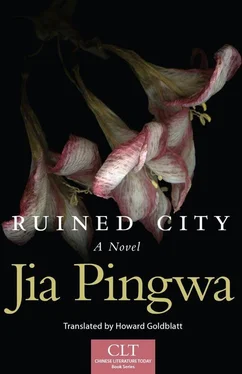“You’re a popular figure,” Li Hongwen commented. “As I said before, the only thing Cao Xueqin wrote was the novel Dream of the Red Chamber , but it has provided generations of scholars with a bountiful feast. Now you, Zhuang Zhidie, have reached the level of providing for others. Zhou Min’s article is not long, barely enough for him to nibble at your toes. I wonder what I’d get if I wrote about you?”
“Nothing, at least nothing from me,” Zhuang replied.
“All right, then one day I’ll write a long piece and sign it with a woman’s name. What will you do then? Probably let me have a bite of your tongue.”
Zhuang laughed and said, “You can chew on my hemorrhoids.”
Zhou Min, who had been quietly making tea for Zhuang, walked up.
“Zhuang Laoshi, this is my first article, so please don’t be stingy with your views.”
Putting the lighthearted banter aside, Zhuang said that he had come specifically because of that article, which he found somewhat troubling. Zhong tensed up.
“What bothers you about it?”
“Everything is fine except for the part about my relationship with Miss X. It was overblown, and there could be repercussions.”
“I considered that,” Zhong said. “I asked Zhou Min where he got his material, and he said it was all based on fact.”
“It looks real, but the way it’s written, it feels different. No names are mentioned, and yet the circumstances and images of the people involved are self-evident. You know that Jing Xueyin and I were close, but we never had a romantic relationship.”
“So what?” Li interjected. “The woman in the article comes across as noble. What’s wrong if you were in love? It’s perfectly acceptable to have romantic relationships before marriage. Besides, now that you’re a celebrity, she should feel honored to have had a fling with you. I’ll bet she can’t wait for the whole world to learn about this beautiful love story.”
“Stop the nonsense, Hongwen,” Zhuang objected. “I trust her not to raise a stink, but we are, after all, in China, where we must face certain realities. She’s a wife and a mother, and a member of the leadership. No one will escape the fallout if something happens.”
“What do you suggest?” Zhong asked.
“That you immediately send someone to Jing’s house with a copy of the magazine and explain the situation to nip any potential problems in the bud.”
“I’ve already been there,” Zhou cut in. “She’s not home yet.”
“Go back as soon as she is,” Zhuang said.
“Don’t worry,” Li said. “We’ll take care of it. But not today. Stick around. Zhou can buy you lunch out of his fee, and the rest of us will get a share.”
“No problem,” Zhou replied. “My treat. I’ll buy as many pork jelly buns from Cao’s Damaishi Street shop as you can eat.”
“I see Li Hongwen hasn’t changed a bit,” Zhuang said. “He’s always looking to be treated, but never offers to treat anyone else.”
“I can’t help it. My wife holds the purse strings,” Li said. “If you don’t want Zhou Min to spend the money, then it’s on you.”
“How about a game of mahjong?” Gou Dahai said. “Winner treats.”
“What do you say?” Zhuang asked Zhong.
“Go ahead as long as you don’t play for money,” Zhong said. “But you’ll have to excuse me. I have something to attend to.”
With a smile, Zhuang shook hands with Zhong and walked him to the door. Li closed the door after Zhong left.
“How’s that for a boss?” he said. “See how clever he is with words? He has no objection to our game of mahjong, but he’ll be blameless if there’s a problem. That’s true leadership quality.”
“If he actually had that quality,” Gou said, “he wouldn’t still be an editor-in-chief, without making the grade of a section cadre.”
“He’s timid,” Zhuang said. “He has dodged trouble his whole life.”
After turning the desks sideways, Li took a set of tiles out of his drawer, while Zhou Min placed a cup of tea and an ashtray before each man.
“We have enough for a game,” Zhuang said to Zhou. “So why don’t you run over to the municipal newspaper for me?”
“What do you need?”
“Here’s an article I’ve written about a local entrepreneur. Take it to Mr. Zhang, the head of the arts and culture section, and ask him to print it as soon as possible.”
Zhou Min left in high spirits.
So Zhuang, Li, Gou, and a young editor named Fang drew lots for the seating. The results? Zhuang Zhidie in the east, Li Hongwen in the west, Gou Dahai in the north, and Xiao Fang in the south. Li wanted to change seats with Gou, saying that Zhuang was well heeled and today he was going to share his wealth with the rest of us. But Gou was such a poor player, he would inevitably feed him winning tiles.
“The problem isn’t with Gou Dahai,” Zhuang said to Li. “It’s with you, since you were born under the sign of wood, while the north seat has water quality.”
“So you know about such things,” Li said.
“I know you.”
Li blushed. “As I said, you have to lose today. How much do you have?”
Zhuang took off his shoes to show a ten-yuan bill hidden in each.
“Aren’t you the sneaky one, Zhuang Laoshi,” Gou said. “Who carries money in his shoes?”
“Money gave me a hard time back when I worked at the Department of Culture, so now I keep it under my feet.”
“There are only two bills,” Li said. “Will that be enough for my play?”
“Don’t worry,” Zhuang said, “I’ll borrow the money to pay you if you beat me. But you should know that I’m an expert at grabbing knives barehanded.”
Zhuang consistently picked up usable discarded tiles in the opening round, so upsetting Li that he cursed the tiles as ass-wipes. Though he didn’t smoke, he demanded one of Zhuang’s cigarettes to share in the man’s good luck, but ended up coughing with watery eyes before he finished it.
At the mention of cigarettes, Xiao Fang asked Zhuang if he had smoked Zhong’s cigarettes when they were colleagues in the Department of Culture. The topic of Zhong’s cigarettes naturally led to talk about Zhong himself.
“How’s he doing these days? Does his wife still come to the office?”
“That man has suffered plenty,” Gou said. “On top of being labeled a Rightist for twenty years, he married an awful woman. She came here last month and, in front of everyone, scratched his face bloody.”
“What can he do?” Zhuang said. “They were already living apart when we were together in the Department of Culture, and he panicked every time she came to see him. We encouraged him to get a divorce, but she wouldn’t hear of it. I don’t know how he’s managed all these years, especially now that times have changed.”
Li put out a tile, but changed his mind when Zhuang was about to pick it up. Saying it was a wrong play, Li took it back and offered a new one.
“I’ve got a secret, but you’ll all have to promise to keep it in this room.”
“Li Laoshi always has secrets,” Fang said.
“Li Hongwen could have been a spy,” Zhuang said. “He was the first to know when Deputy Head Yan of the Department of Culture was having an affair with the widow Wei. He actually spent four hours hiding in the toilet watching her room to discover what time the deputy head went in and when the lights were turned off.”
“Didn’t they get married?” Li said.
“They sure did, so what was the point of spying on them?” Zhuang asked.
“They have me to thank. They wouldn’t have gotten married if I hadn’t revealed their secret.”
“All right, then. What’s the secret about Zhong?” Zhuang asked.
“What do you think has kept him going all these years? He has his own spiritual support. He fell for a girl in his class when he was young. Soon after college he was labeled a Rightist, and later he heard that she suffered the same fate. Being a Rightist meant he had trouble finding a wife, so eventually he married his current wife, a woman from the countryside, through a matchmaker. Several years ago, he learned that the girl from his college days was still alive and teaching at a high school in Anhui. Not only that, she was divorced and lived alone. Zhong could not stop talking about her, even wrote her four letters. For some reason, he never received a reply. Maybe she’s dead or maybe she’s no longer teaching at the school. This might be nothing but gossip. But like a possessed man, he checks the mailroom every day to see if there’s a letter from her.”
Читать дальше


![Matthew Vincent - [you] Ruined It for Everyone!](/books/216429/matthew-vincent-you-ruined-it-for-everyone-thumb.webp)









